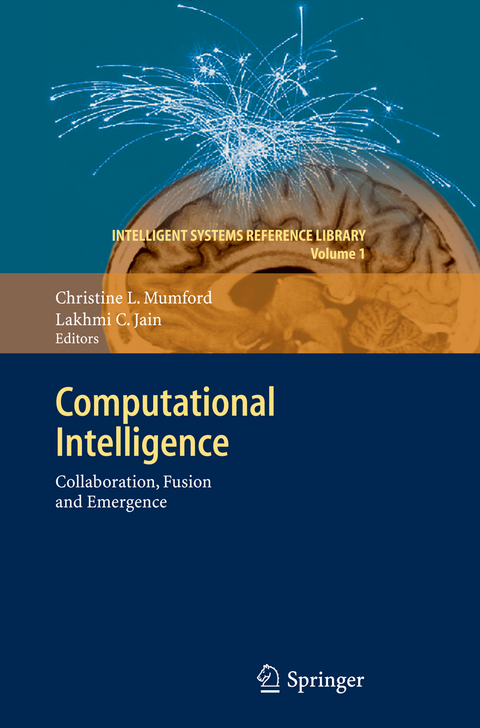
Computational Intelligence
Springer Berlin (Verlag)
9783642017988 (ISBN)
This book is about synergy in computational intelligence (CI). It is a c- lection of chapters that covers a rich and diverse variety of computer-based techniques, all involving some aspect of computational intelligence, but each one taking a somewhat pragmatic view. Many complex problems in the real world require the application of some form of what we loosely call "intel- gence"fortheirsolution. Fewcanbesolvedbythenaiveapplicationofasingle technique, however good it is. Authors in this collection recognize the li- tations of individual paradigms, and propose some practical and novel ways in which di?erent CI techniques can be combined with each other, or with more traditional computational techniques, to produce powerful probl- solving environments which exhibit synergy, i. e. , systems in which the whole 1 is greater than the sum of the parts . Computational intelligence is a relatively new term, and there is some d- agreement as to its precise de?nition. Some practitioners limit its scope to schemes involving evolutionary algorithms, neural networks, fuzzy logic, or hybrids of these. For others, the de?nition is a little more ?exible, and will include paradigms such as Bayesian belief networks, multi-agent systems, case-based reasoning and so on. Generally, the term has a similar meaning to the well-known phrase "Arti?cial Intelligence" (AI), although CI is p- ceived moreas a "bottom up" approachfrom which intelligent behaviour can emerge,whereasAItendstobestudiedfromthe"topdown",andderivefrom pondering upon the "meaning of intelligence". (These and other key issues will be discussed in more detail in Chapter 1.
Synergy in Computational Intelligence.- Computational Intelligence: The Legacy of Alan Turing and John von Neumann.- Fusing Evolutionary Algorithms and Fuzzy Logic.- Multiobjective Evolutionary Algorithms for Electric Power Dispatch Problem.- Fuzzy Evolutionary Algorithms and Genetic Fuzzy Systems: A Positive Collaboration between Evolutionary Algorithms and Fuzzy Systems.- Multiobjective Genetic Fuzzy Systems.- Adaptive Solution Schemes.- Exploring Hyper-heuristic Methodologies with Genetic Programming.- Adaptive Constraint Satisfaction: The Quickest First Principle.- Multi-agent Systems.- Collaborative Computational Intelligence in Economics.- IMMUNE: A Collaborating Environment for Complex System Design.- Bayesian Learning for Cooperation in Multi-Agent Systems.- Collaborative Agents for Complex Problems Solving.- Computer Vision.- Predicting Trait Impressions of Faces Using Classifier Ensembles.- The Analysis of Crowd Dynamics: From Observations to Modelling.- Communications for CI Systems.- Computational Intelligence for the Collaborative Identification of Distributed Systems.- Collaboration at the Basis of Sharing Focused Information: The Opportunistic Networks.- Artificial Immune Systems.- Exploiting Collaborations in the Immune System: The Future of Artificial Immune Systems.- Parallel Evolutionary Algorithms.- Evolutionary Computation: Centralized, Parallel or Collaborative.- CI for Clustering and Classification.- Fuzzy Clustering of Likelihood Curves for Finding Interesting Patterns in Expression Profiles.- A Hybrid Rule-Induction/Likelihood-Ratio Based Approach for Predicting Protein-Protein Interactions.- Improvements in Flock-Based Collaborative Clustering Algorithms.- Combining Statistics and Case-Based Reasoning for Medical Research.- Collaborative and Experience-Consistent Schemes of System Modelling in Computational Intelligence.
| Erscheint lt. Verlag | 21.7.2009 |
|---|---|
| Reihe/Serie | Intelligent Systems Reference Library |
| Zusatzinfo | XV, 732 p. |
| Verlagsort | Berlin |
| Sprache | englisch |
| Maße | 155 x 235 mm |
| Gewicht | 1232 g |
| Themenwelt | Informatik ► Theorie / Studium ► Künstliche Intelligenz / Robotik |
| Mathematik / Informatik ► Mathematik ► Angewandte Mathematik | |
| Technik | |
| Schlagworte | Agents • Case-Based Reasoning • Computational Intelligence • Evolution • evolutionary algorithm • evolutionary computation • Fusion of Intelligent Agents • Fusion of Intelligent Paradigms • Fusion of Neural Nets • Fuzzy Logic • fuzzy system • genetic programming • learning • Modeling • multi-agent system |
| ISBN-13 | 9783642017988 / 9783642017988 |
| Zustand | Neuware |
| Informationen gemäß Produktsicherheitsverordnung (GPSR) | |
| Haben Sie eine Frage zum Produkt? |
aus dem Bereich


